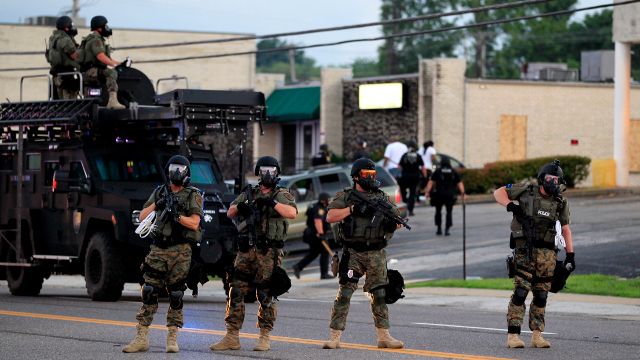
This post first appeared at The American Prospect.
Every once in a while, a dramatic news story can actually produce real reform. More often the momentum peters out once the story disappears from the news (remember how Sandy Hook meant we were going to get real gun control?), but it can happen. And now, after the aftermath of the killing of Michael Brown in Ferguson, Missouri, turned to a chaotic nightmare of police oppression, we may have an opportunity to examine, and hopefully reverse, a troubling policy trend of recent years.
The focus has now largely turned from an old familiar story (cops kill unarmed black kid) to a relatively unfamiliar one, about the militarization of the police. The images of officers dressed up like RoboCop, driving around in armored assault vehicles, positioning snipers to aim rifles at protesters and firing tear gas and rubber bullets at Americans standing with their hands up saying “Don’t shoot!” has lots of Americans asking how things got this way. This issue offers the rarest of all things, an opportunity for bipartisan cooperation.
One member of Congress, Rep. Hank Johnson, has already said he’ll be introducing a bill to cut back on the 1033 program, under which the Department of Defense unloads surplus (and often brand-new) military equipment to local police departments at little or no cost. So for instance, a town might be able to acquire a Mine Resistant Ambush Protected vehicle (MRAP), designed to protect soldiers against roadside bombs and worth hundreds of thousands of dollars, for two or three grand. Radley Balko found towns with as few as 3,900 residents that had acquired an MRAP.
In the past, all that firepower has usually been directed at individuals — the person suspected of selling drugs who’s sitting at his kitchen table when a SWAT team made up of local cops, fancying itself Seal Team Six taking down Osama bin Laden, comes barrelling through the wall. But in Ferguson, a militarized police force was unleashed on an entire community.
On Thursday, Rand Paul wrote an excellent op-ed in Time magazine on both the militarization of law enforcement and the unequal treatment of black Americans by the police. As I’ve suggested elsewhere, this would be a great opportunity for a liberal who, like Paul, has something of a national constituency — let’s say Elizabeth Warren — to join with him and push for a bill, whether it’s the Senate version of what Hank Johnson is proposing or a different way to accomplish a similar set of goals.
So could they actually come together? This is unlike Sandy Hook for one big reason: in that case, there were powerful interests standing in the way of change. It wasn’t just the power of the NRA that stopped any gun reform from happening, it was the fact that almost no elected official in the Republican party wanted it either. That’s not the case here — as much as cops might like these shiny toys that make them feel like warriors, there isn’t a core interest of the GOP at work.
On the other hand, there are limits to what the federal government can do. The militarization of the country’s police forces is something that has been growing for a couple of decades, fueled first by the War on Drugs and then by the insane idea that the police in every hamlet in every corner of the country needed to be able to wage battles against Al Qaeda strike teams. Congress could turn off the spigot that pours this equipment into these communities, but unless the federal government starts repossessing the equipment it already distributed (highly unlikely, to say the least), police departments all over the country will still be awash in military gear.
And that’s the biggest challenge: the problems the Ferguson case highlights are widely distributed, through thousands of police departments and millions of interaction between cops and citizens. The federal government can respond in a limited way to what we’ve all seen, but its actions will go only so far.
But I can’t imagine there’s a police chief anywhere in America who hasn’t looked at this situation and concluded that the Ferguson police completely bollixed it up. They also can’t help but notice what happened when the Ferguson police were told to stand down in favor of the Missouri state troopers, who didn’t bother with the riot gear or armored personnel carriers, but just went out and listened to people, and the result was so different. So maybe some of those police chiefs will examine their own policies, when it comes to both using that equipment and dealing with crowds of protesters. Ferguson surely won’t change everything. But it might be a start.


